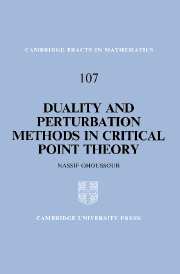Book contents
- Frontmatter
- Contents
- Preface
- Introduction
- Chapter 1 Lipschitz and Smooth Perturbed Minimization Principles
- Chapter 2 Linear and Plurisubharmonic Perturbed Minimization Principles
- Chapter 3 The Classical Min-Max Theorem
- Chapter 4 A Strong Form of the Min-Max Principle
- Chapter 5 Relaxed Boundary Conditions in the Presence of a Dual Set
- Chapter 6 The Critical Set in the Mountain Pass Theorem
- Chapter 7 Group Actions and Multiplicity of Critical Points
- Chapter 8 The Palais-Smale Condition Around a Dual Set – Examples
- Chapter 9 Morse Indices of Min-Max Critical Points – The Non Degenerate Case
- Chapter 10 Morse Indices of Min-Max Critical Points – The Degenerate Case
- Chapter 11 Morse-type Information on Palais-Smale Sequences
- Appendices by David Robinson
- References
- Index
Introduction
Published online by Cambridge University Press: 18 December 2009
- Frontmatter
- Contents
- Preface
- Introduction
- Chapter 1 Lipschitz and Smooth Perturbed Minimization Principles
- Chapter 2 Linear and Plurisubharmonic Perturbed Minimization Principles
- Chapter 3 The Classical Min-Max Theorem
- Chapter 4 A Strong Form of the Min-Max Principle
- Chapter 5 Relaxed Boundary Conditions in the Presence of a Dual Set
- Chapter 6 The Critical Set in the Mountain Pass Theorem
- Chapter 7 Group Actions and Multiplicity of Critical Points
- Chapter 8 The Palais-Smale Condition Around a Dual Set – Examples
- Chapter 9 Morse Indices of Min-Max Critical Points – The Non Degenerate Case
- Chapter 10 Morse Indices of Min-Max Critical Points – The Degenerate Case
- Chapter 11 Morse-type Information on Palais-Smale Sequences
- Appendices by David Robinson
- References
- Index
Summary
Eigenvectors, geodesies, minimal surfaces, harmonic maps, conformal metrics with prescribed curvature, subharmonics of Hamiltonian systems, solutions of semilinear elliptic partial differential equations and Yang-Mills fields are all critical points of some functional on an appropriate manifold. This is not surprising since many of the laws of mathematics and physics can be formulated in terms of extremum principles.
Finding such points by minimization is as ancient as the least action principle of Fermat and Maupertuis, and the calculus of variations has been an active field of mathematics for almost three centuries. For more general, unstable extrema, the methods have a more recent history. Two, not unrelated, theories are available for dealing with the existence of such points: Morse theory and the min-max methods (or the calculus of variations in the large) introduced by G. Birkhoff and later developed by Ljusternik and Schnirelmann in the first half of this century. Currently, both theories are being actively refined and extended in order to overcome the limitations to their applicability in the theory of partial differential equations: limitations induced by the infinite dimensional nature of the problems and by the prohibitive regularity and non-degeneracy conditions that are not satisfied by present-day variational problems.
- Type
- Chapter
- Information
- Duality and Perturbation Methods in Critical Point Theory , pp. xiii - xviiiPublisher: Cambridge University PressPrint publication year: 1993

